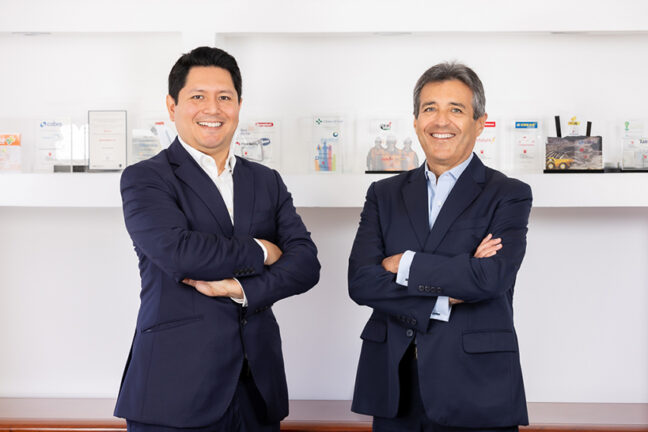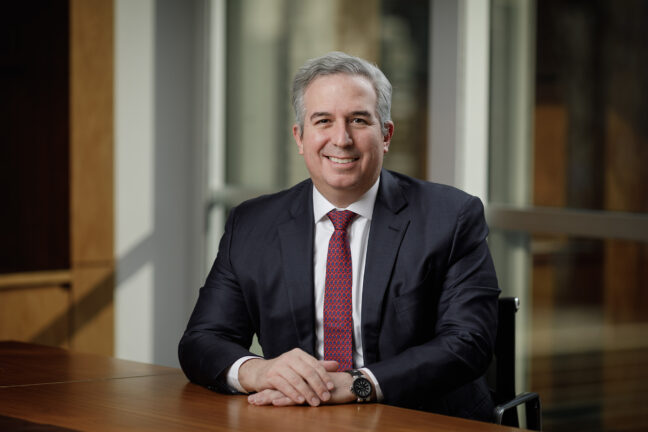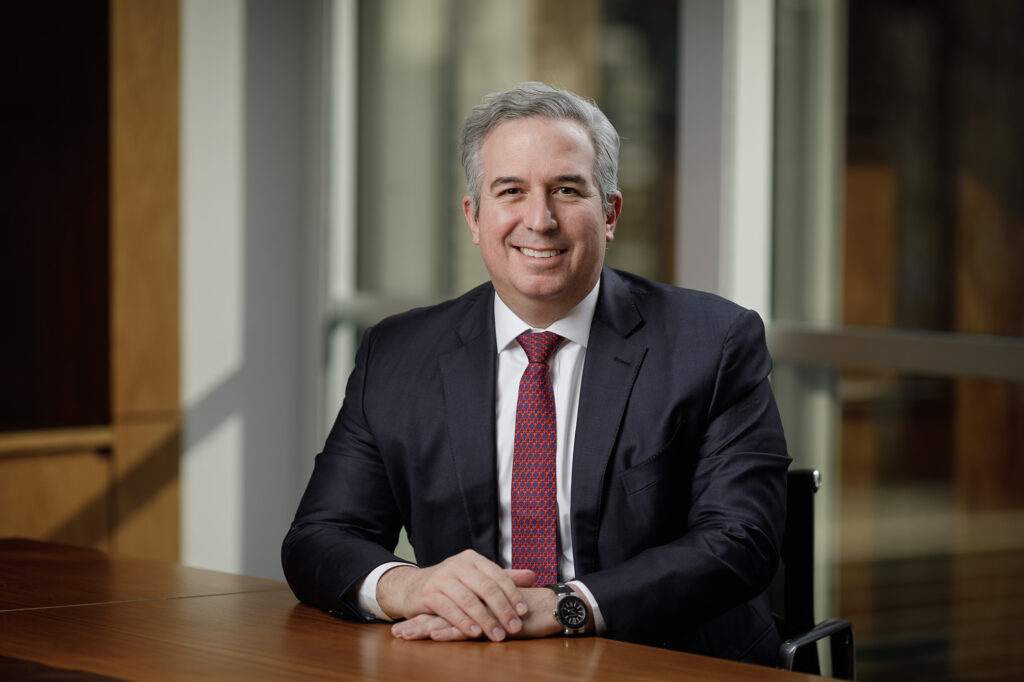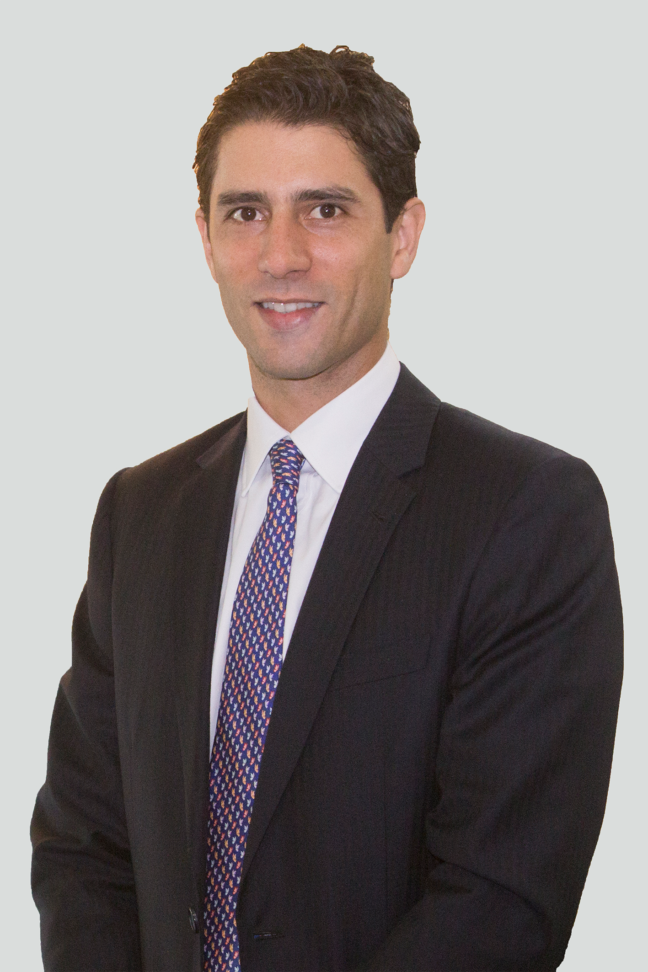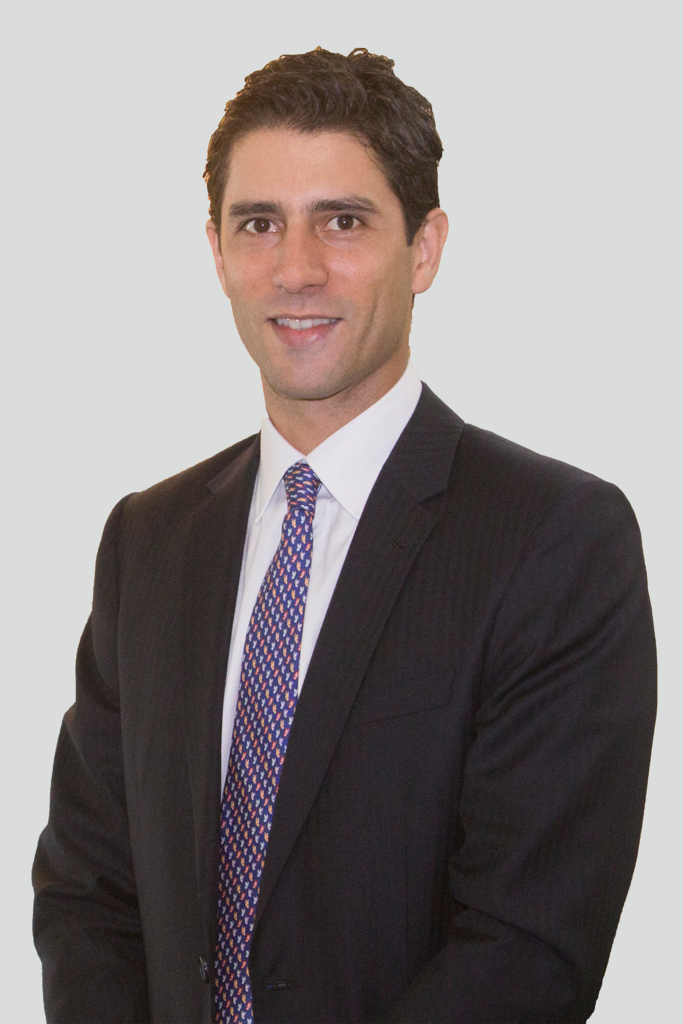Content available in English and Spanish (scroll down)
TTR Dealmaker Q&A with APOYO Finanzas Corporativas Senior team Eduardo Campos and Mauricio Concha Zegarra
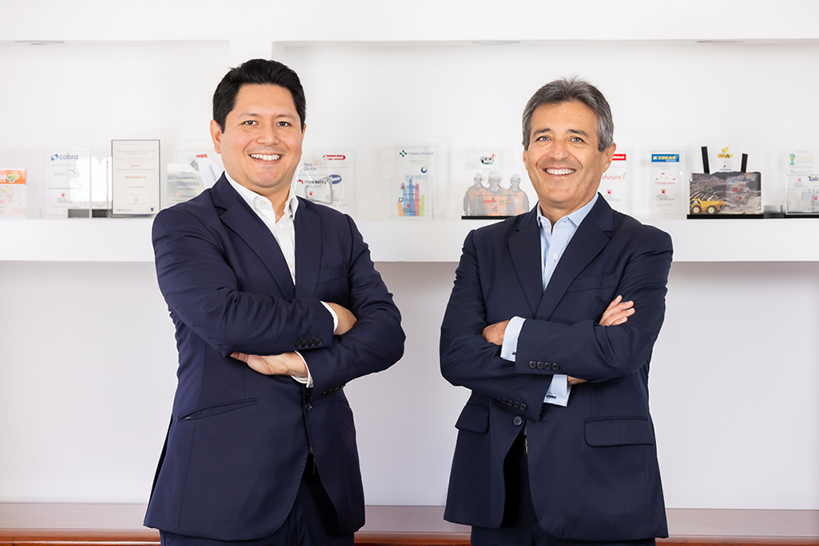
He is a partner at APOYO Finanzas Corporativas, a leading M&A advisory boutique focused on Latin America. Eduardo has led multiple transactions in various sectors, including financial institutions, infrastructure, technology, media, consumer goods, healthcare, real estate, agriculture, among others. His experience also includes restructuring and financial structuring processes through financial institutions and bonds.
He holds a degree in economics from the Pontificia Universidad Católica del Perú and a master’s degree in economics from the University of Western Ontario.
He is Senior Vice President of APOYO Corporate Finance. Mauricio has led and participated in M&A processes, fairness opinions, capital raising and debt issuances in Latin America, United States and Europe, working with the most prestigious banking groups, underwriters, private equity funds and FinTech / Venture Capital in the aforementioned geographies.
He holds a degree in economics from Universidad del Pacifico and an MBA from Harvard Business School and is a certified Financial Risk Manager – Global Association of Risk Professionals (GARP).
TTR: First of all, how did APOYO Corporate Finance do in Latin America in 2022, and what data can you provide?
2022 was a year with a very challenging macroeconomic context with high interest rates and high inflation levels, additionally multiple events had an impact in the global economy and led to high volatility in the market, such as the conflict between Ukraine and Russia. Locally, we also faced a challenging environment due to the political turmoil that continues to generate uncertainty. As a result, the total value and total number of transactions in the M&A market decreased not only in Peru, but also in Latin America as a whole.
Despite the challenging environment we closed multiple transactions which included buy-side mandates (advisory to Grupo Cobra in the acquisition of BISA), strategic partnerships (strategic alliance to create Hy-Line Peru between San Fernando and International Layer Distribution) and cross-border transactions (advisory to Talma Servicios Aeroportuarios in the acquisition of SAI in Colombia). We are very active with multiple sell-side mandates where we see a better fit for strategic buyers.
Moreover, we are providing advisory in special situations, specifically in mandates to restructure financial and commercial liabilities to maintain business continuity in the medium and long term. The long-lasting effects of the pandemic and the continuing political turmoil caused difficulties for many companies across the country, especially considering the increasing financial cost, which reduces cash flow available.
Overall, despite the challenging political and economic environment, 2022 has been a solid year for APOYO Finanzas Corporativas. We closed three M&A deals and supported our clients with a broader and more flexible range of financial advisory solutions.
TTR: What is your assessment of the M&A market in 2022 globally, and do you see next year as a good year in terms of number and value of deals?
Despite a lower number of M&A deals in Latin America, the market remains dynamic and new processes started which could lead the trend for this year. However, current transactions are taking longer than expected and strategic players are taking the lead in acquisitions processes.
In this uncertain environment, it is difficult to establish medium and long-term scenarios, therefore is more complex to plan investments (organic and inorganic). The overall consensus of Peruvian businessmen is that they are facing a very unpredictable political crisis without clear signals to make investment decisions. Even though we are going through a complex period in the country, 2023 has been an active month. We are getting more valuation request which seems to be a priority for boards of directors and C-suite to evaluate strategic options.
TTR: How would you describe the current situation of the M&A market players in Peru with the current regional political and economic situation in 2022?
Current M&A market in Peru is challenging and in that sense each participant (advisors, buyers, sellers) is looking for the best way to adapt to the new market conditions. In general, we can call current market environment as “opportunistic”.
Regarding buyers, they are looking for diversification in other geographies, not necessarily in Latin America but also in North America and Europe. Strategic players can take advantage of economies of scale to drive synergies. Financial investors are being more cautious in this context due to the high interest rates and challenging growth estimates for targets in the coming years.
On the local sellers’ side market, we see slower processes and lower tickets; additionally, some international players with a local footprint are divesting their operations in the region. We are seeing less “competitive processes” and more bilateral negotiations or processes with flexibility in deadlines.
TTR: Which sectors could offer the greatest opportunities in Latin America for international investors in 2023 and why?
In general, we see a growing appetite in the technology sector, especially for companies that provide solutions to businesses and have local teams (mainly developers).
We also see increasing activity in the venture capital market, with an increasing number of corporates looking for companies in the startup ecosystem to capture talent and disruptive solutions to challenge obsolescence.
The logistics sector is also active, where companies are looking for add-ons to provide a wide range of services or to access new markets (our recent advisory to Talma Servicios Aeroportuarios in the acquisition of SAI in Colombia). Finally, the renewable energy sector is very active, where early-stage assets, including greenfield projects, are being evaluated by leading global players in the sector.
TTR: How will the current political and social situation in Peru affect the M&A market in the country and in Latin America?
We are facing a complex political situation in Peru. The current social crisis led to road blockades and supply-side inflationary pressure, combined with the depreciation of the exchange rate.
Recently, local buyers are being more cautious, local companies are prioritizing day-to-day operations while halting CAPEX and inorganic growth. In Peru, we observe two main concerns in the business environment going forward: the approval of the early elections and the handling of the social unrest.
TTR: What will be the main challenges for APOYO Corporate Finance in terms of M&A transactions in the coming months?
Key challenges include an adapting constantly to the political turbulence and looking for new opportunities with the “right” angle, such as distressed M&A, which is attractive to long-term strategic players in order to consolidate their operations in the country.
It is also key to understand the medium and long-term growth goals of companies. We come from a pandemic followed by a year of recovery in most industries; however, in 2022 the landscape changed due to high inflation and higher interest rates.
In M&A processes, it is a challenge to determine “normalized” (pre-COVID) sales /EBITDA levels, which in lead to discrepancies between sellers and buyers. A critical task for us is to align the growth expectations of the targets. On the other hand, we are seeing more deal structures involving earnouts with “longer terms” and with a higher percentage than usual (+30%).
As trusted advisors it is essential to guide and educate our clients regarding the impact of macroeconomic and political turbulence on the value of the company and therefore the implied multiples.
Spanish version
Es socio de APOYO Finanzas Corporativas, boutique líder en asesoramiento en fusiones y adquisiciones enfocada en Latinoamérica. Eduardo ha conducido múltiples transacciones en diversos sectores, incluyendo instituciones financieras, infraestructura, tecnología, medios de comunicación, bienes de consumo, salud, bienes raíces, agricultura, entre otros. Su experiencia también incluye procesos de reestructuración y estructuración financiera a través de instituciones financieras y bonos.
Es economista de la Pontificia Universidad Católica del Perú y posee un máster en Economía por la Universidad de Western Ontario.
Es es vicepresidente senior de APOYO Finanzas Corporativas. Mauricio ha liderado y participado en procesos de fusiones y adquisiciones, estudios de factibilidad, levantamiento de capital y emisiones de deuda en Latinoamérica, Estados Unidos y Europa, trabajando con los principales grupos bancarios, aseguradores, fondos de private equity y FinTech en las geografías mencionadas.
Es licenciado en economía de la Universidad del Pacífico y posee un MBA por la Harvard Business School, además cuenta con la certificación Financial Risk Manager – Global Association of Risk Professionals (GARP).
TTR: En primer lugar, ¿qué tal le fue a APOYO Finanzas Corporativas en 2022 en América Latina? ¿Qué datos nos pueden aportar?
El año 2022 ha sido un año caracterizado por un contexto global muy desafiante a nivel macroeconómico, con altas tasas de interés y acompañado de distintos sucesos que impactaron la economía global y generaron mucha volatilidad, como el conflicto entre Ucrania y Rusia. Asimismo, a nivel local también hemos enfrentado un contexto desafiante debido a la crisis política que atraviesa el Perú, y que ha generado, y sigue generando incertidumbre. Todo ello se tradujo en que el valor total y número de transacciones en el mercado de M&A se haya reducido no solo en Perú, sino a nivel de Latinoamérica.
A pesar del contexto desafiante, como APOYO Finanzas Corporativas, cerramos múltiples transacciones en mandatos de compra (asesoría a Grupo Cobra en la adquisición de BISA), incorporación de socios estratégicos (Alianza estratégica para la creación de Hy-Line Perú con San Fernando e International Layer Distribution) y transacciones cross-border (Adquisición de SAI, Colombia, por Talma Servicios Aeroportuarios). Estamos bastante activos con múltiples mandatos de venta en los cuales vemos a los compradores estratégicos con mayor apetito de inversión que inversionistas financieros.
Por otro lado, estamos muy activos en asesorías a empresas que buscan reestructurar sus pasivos financieros y comerciales para asegurar la sostenibilidad del negocio en el mediano y largo plazo. Los rezagos de la pandemia y la turbulencia política han causado dificultades en muchos negocios a nivel nacional, sobre todo considerando los incrementos en el costo de financiamiento mes a mes, lo cual reduce la generación de flujos.
En términos generales, pese al contexto desafiante a nivel político y económico, el año 2022 ha tenido un balance positivo para APOYO Finanzas Corporativas. Como resultado, hemos podido cerrar tres transacciones de M&A y acompañar a nuestros clientes con una gama más amplia y flexible en servicios de asesoría financiera.
TTR: ¿Qué balance haría del mercado M&A en 2022 en el ámbito global? ¿Considera que el próximo año será un buen año en términos de número e importe de operaciones?
A pesar de la reducción en el número de transacciones de M&A en Latinoamérica, el mercado se mantiene dinámico y se han iniciado nuevos procesos que podrían marcar la tendencia del presente año. Sí notamos que los procesos son más largos y que los principales jugadores son inversionistas estratégicos.
En esta coyuntura de incertidumbre, en la que resulta difícil establecer escenarios de mediano y largo plazo, resulta más complejo planificar inversiones. El sentimiento general del empresario peruano es que se enfrenta a una crisis política muy impredecible y sin señales claras para poder tomar decisiones estratégicas y de inversión. Sin embargo, a pesar de que estamos atravesando un contexto complicado en el país, el inicio del 2023 ha tenido un ritmo más acelerado. Vemos como prioridad de los directorios poder determinar el valor de la empresa para evaluar opciones estratégicas.
TTR: ¿Cómo describe la situación actual de los players del mercado M&A en Perú con la actual coyuntura política y económica regional en 2022?
El contexto actual es retador en el mercado de M&A en Perú y en esa línea cada participante (asesores, compradores, vendedores) está buscando adaptarse de la mejor manera a las nuevas condiciones del mercado. En general, el mercado actual es oportunista.
Con respecto a los compradores, ellos están buscando diversificación en otras geografías, no necesariamente en Latinoamérica sino también en Norte América y Europa. Asimismo, estamos viendo mayor fuerza del lado de jugadores estratégicos que pueden aprovechar las economías a escala para generar sinergias. Los inversionistas financieros están siendo más precavidos en este contexto por las altas tasas de interés y perspectivas de crecimiento de las empresas.
Por el lado de los vendedores locales, estamos teniendo procesos más lentos y de menor tamaño; observamos a jugadores internacionales haciendo carve-outs de operaciones en la región. Estamos viendo menos procesos competitivos y más negociaciones bilaterales o procesos flexibles en plazos.
TTR: ¿Cuáles serían los sectores que podrían ofrecer las mayores oportunidades en Latinoamérica a los inversores internacionales en 2023 y por qué?
En general, hemos visto un apetito creciente en el sector de tecnología, especialmente por empresas que brinden soluciones a empresas y que cuenten con programadores o talento local.
También vemos mayor actividad en el mercado de venture capital, en el cual cada vez más empresas corporativas buscan identificar, empresas en el ecosistema de startups para captar talento y soluciones disruptivas para combatir la obsolescencia.
Vemos con buena actividad el sector logístico, las empresas están en la búsqueda de add-ons para bridar servicios diferenciados y tener acceso a nuevos mercados. Finalmente, el sector de energía renovable está activo, donde activos que se encuentran en etapas tempranas, incluyendo proyectos en etapa greenfield, están siendo evaluados por compradores.
TTR: ¿Cómo afectará la actual coyuntura política y social en Perú el mercado de fusiones y adquisiciones en el país y en América Latina?
Indudablemente, estamos ante una situación delicada y compleja para el Perú. Esta crisis social, que ha llevado al bloqueo de carreteras, genera presiones inflacionarias generalizadas, combinadas con la depreciación del tipo de cambio, ante el temor por la situación política.
En los últimos meses los compradores locales vienen actuando con mucha precaución. Las empresas locales están priorizando la operación del día a día y, en consecuencia, han puesto en pausa proyectos de CAPEX y de crecimiento inorgánico. En Perú. vemos que hacia adelante hay dos fuentes de preocupación en el entorno de negocios: la aprobación del adelanto de elecciones y el manejo de la convulsión social.
TTR: ¿Cuáles serán los principales retos para APOYO Finanzas Corporativas en términos de transacciones de M&A en los próximos meses?
Definitivamente el continuar adaptarnos a la turbulencia política y buscar nuevas oportunidades, tales como el distressed M&A que resulta atractivo para jugadores estratégicos de largo plazo y es una oportunidad para que consoliden su operación en el país.
También resulta clave entender cuáles son las perspectivas de crecimiento de mediano y largo plazo de las empresas. Venimos de una pandemia seguida por un año 2021 de recuperación en la mayoría de las industrias; sin embargo, en 2022 el contexto cambió por alta inflación y mayores tasas de interés.
En los procesos de M&A, es un reto entender cuál es el nivel de ventas normalizado de un negocio y el cual es un tema que genera discrepancia al momento de analizar una compra. Constantemente estamos alineando las expectativas de crecimiento de los compradores y vendedores. Por otro lado, estamos viendo más esquemas de pago que involucran earnouts a más largo plazo e incluso con porcentajes más representativos de lo usual (+30%).
A su vez, resulta fundamental acompañar y educar a nuestros clientes con respecto al impacto de la turbulencia macroeconómica y política en el valor de la empresa y por ende los múltiplos implícitos.
